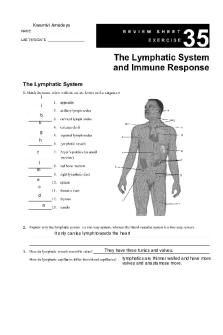Ch 12 Lymphatic & Body Defenses PDF

| Title | Ch 12 Lymphatic & Body Defenses |
|---|---|
| Course | Physiological Aspects of Kinesiology |
| Institution | Texas A&M University-Corpus Christi |
| Pages | 2 |
| File Size | 35.1 KB |
| File Type | |
| Total Downloads | 12 |
| Total Views | 161 |
Summary
Download Ch 12 Lymphatic & Body Defenses PDF
Description
Assignment 12: The Lymphatic System and Body Defenses 1. What is the most important function of the lymph nodes? a. Removing foreign materials, bacteria, and tumor cells from the lymphatic stream and produce lymphocytes that function in the immune response 2. Respond to the following: a. What is the specific role of tonsils? b. The spleen? a. Tonsils – trap and remove bacteria or other foreign pathogens entering the throat b. Spleen – destroy worn-out red blood cells and return some of their breakdown products to the liver 3. Respond to the following: a. What is complement? b. Besides bacterial lysis, what are some of the roles of complement? a. Complement – Group of plasma proteins that circulate in the blood in an inactive site b. Roles of complement – enhances phagocytosis, as well as inflammatory and immune responses 4. Define immune response. a. Antigen-specific defenses by activated lymphocytes (T & B cells); response of the body to foreign substances 5. What is the difference between humoral and cellular immunity? a. Humoral immunity – immunity provided by antibodies released by sensitized B cells (antibody-mediated immunity) b. Cellular immunity – immunity conferred by lymphocytes called T cells (cellmediated immunity) 6. Define immunocompetence. a. Capability to respond to a specific antigen by binding to it with antigen specific receptors that appear on the lymphocyte’s surface 7. Respond to the following: a. Name the cell types that would be present in a B cell clone. b. Give the function of each. a. Present in a B cell clone – Plasma and Memory cells b. Function: i. Plasma – antibody producing ‘factories’ ii. Memory cells – responsible for immunological memory 8. How do antibodies help defend the body? a. Antibodies help to defend the body by complement fixation and neutralization, which are the most important 9. What events can result in the loss of self-tolerance and autoimmune disease?
a. A change in self-antigens, not previously recognized by the immune system and cross-reaction of antibodies produced against foreign antigens with self-antigens 10. Would lack of B cells for a particular antigen impact the primary or the secondary humoral response? a. The secondary humoral response would look similar to the primary humoral response...
Similar Free PDFs

Ch 12 Lymphatic & Body Defenses
- 2 Pages

Ch. 21 Lymphatic System & Immune
- 14 Pages

CH 2 BODY Organization
- 12 Pages

Justification defenses
- 5 Pages

Excuse Defenses
- 5 Pages

Lymphatic System
- 6 Pages

Ch 12 summary
- 13 Pages

Chemistry CH 12
- 3 Pages

Chapter 8- Affirmative Defenses
- 3 Pages

CH 12 cardiovascular
- 18 Pages

Ch 12 - Test bank
- 20 Pages
Popular Institutions
- Tinajero National High School - Annex
- Politeknik Caltex Riau
- Yokohama City University
- SGT University
- University of Al-Qadisiyah
- Divine Word College of Vigan
- Techniek College Rotterdam
- Universidade de Santiago
- Universiti Teknologi MARA Cawangan Johor Kampus Pasir Gudang
- Poltekkes Kemenkes Yogyakarta
- Baguio City National High School
- Colegio san marcos
- preparatoria uno
- Centro de Bachillerato Tecnológico Industrial y de Servicios No. 107
- Dalian Maritime University
- Quang Trung Secondary School
- Colegio Tecnológico en Informática
- Corporación Regional de Educación Superior
- Grupo CEDVA
- Dar Al Uloom University
- Centro de Estudios Preuniversitarios de la Universidad Nacional de Ingeniería
- 上智大学
- Aakash International School, Nuna Majara
- San Felipe Neri Catholic School
- Kang Chiao International School - New Taipei City
- Misamis Occidental National High School
- Institución Educativa Escuela Normal Juan Ladrilleros
- Kolehiyo ng Pantukan
- Batanes State College
- Instituto Continental
- Sekolah Menengah Kejuruan Kesehatan Kaltara (Tarakan)
- Colegio de La Inmaculada Concepcion - Cebu




